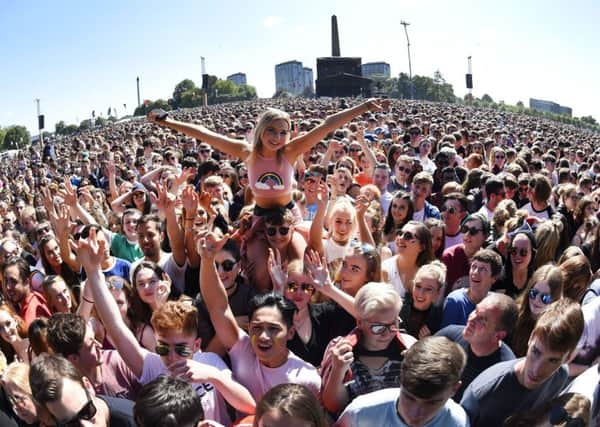Arts review of 2017: Fiona Shepherd on the year in pop


But that security was shattered on 22 May when a suicide bomber struck in the foyer of the Manchester Arena, killing 22 young pop fans and their chaperoning parents as they exited an Ariana Grande concert. As with the Paris Bataclan attack in 2015, the initial shock was swiftly replaced with resolve, which was crystallised when Grande fulfilled her pledge to return to Manchester a mere 13 days later to helm the One Love Manchester benefit concert, an all-star celebration of the galvanizing power of pop music as a force for good which drew comparisons with Live Aid.
The healing soundtrack of the day was Oasis anthem Don’t Look Back In Anger as performed by a resurgent Liam Gallagher, hobnobbing with pop artists he had previously despised and finally vying with brother Noel for solo success.
Advertisement
Hide AdAfter a 50-year hiatus, the Gallaghers’ fave raves The Beatles returned to the top of the album charts with the anniversary re-issue of Sgt. Pepper’s Lonely Hearts Club Band. Despite the relative health of album sales and the continuing upturn in vinyl, it’s hard to imagine any of the 2017 crop of releases achieving such longevity. Kendrick Lamar perhaps, for continuing to push the musical, social and political parameters of hip-hop with his latest album, Damn, another accomplished document of the disturbed times.
However, comeback albums by musical icons from Morrissey to U2, Björk to Beck compared poorly against their own catalogues while bright young(er) hopes from Lorde to breakthrough success Rag’n’Bone Man were hailed as pop saviours but failed to challenge the status quo. As for bright older hopes, centenarian Vera Lynn was the year’s best selling female artist – until the all-conquering Taylor Swift put paid to her reign.
Away from the mainstream, Scotland’s grassroots musicians continued to flourish artistically with some of the year’s best music emerging from homegrown indie labels. Glasgow-via-Elgin-and-Paris singer/songwriter Siobhan Wilson released the ravishing There Are No Saints on Edinburgh’s Song, By Toad Records, while eclectic sextet Pronto Mama helped the music business students at Glasgow Kelvin College celebrate the 25th birthday of their label, Electric Honey Records (an early home to Belle & Sebastian, Biffy Clyro and Snow Patrol), with their hugely confident debut, Any Joy.
Glasgow/London duo Sacred Paws picked up the 2017 Scottish Album of the Year Award for their debut, Strike A Match, a joyful amalgam of spiky femme punk and Afrobeat guitars, beating their label bosses Mogwai in the process.
But most of the year’s musical highlights were in the concert realm. PJ Harvey’s two-night stint at the Edinburgh Playhouse was a personal highlight, along with Ryan Adams at the Usher Hall and Kraftwerk’s 3D wigout at Glasgow Royal Concert Hall.
In March, the BBC 6 Music Festival was embraced across Glasgow, with the mighty Depeche Mode taking the multi-venue weekend party out on a high with their first Barrowland appearance in more than 30 years.
Advertisement
Hide AdIn July, there was a collective exhalation of relief when the inaugural TRNSMT festival went off like a dream on Glasgow Green, almost banishing the more negative vibes which had hobbled T in the Park in recent years. T is now resting, possibly retired for good, while organisers DF Concerts build on the success of their shiny new city gathering.
There have been other incremental changes to the summer festival scene. Belladrum’s Tartan Heart festival is still going strong, Skye Live is on the up, but Ullapool’s Loopallu has been forced to downsize. Meanwhile, the urban non-camping festivals flourished, including the Edinburgh International Festival’s finely curated contemporary music strand, Aberdeen’s True North, and Summer Nights and the West End Fiesta at Scotland’s mini Hollywood Bowl, the Kelvingrove Bandstand. 2017 also saw the launch of Dundee’s biggest music festival in over a decade in the form of Carnival Fifty Six.
Advertisement
Hide AdEmboldened by the town’s bid to become UK City of Culture in 2021, Paisley’s annual multi-arts festival, The Spree, was bigger and better than ever. Highlights included a triumphant hometown concert from pop superstar Paolo Nutini in a stunningly lit Paisley Abbey, and a genre-spanning celebration of the town’s rich musical heritage in Paisley the Untold Story, generating enough goodwill, civic pride and momentum to see the town right through 2018 and beyond. ■